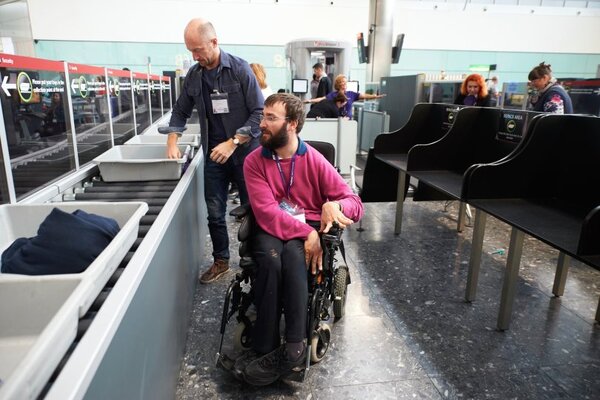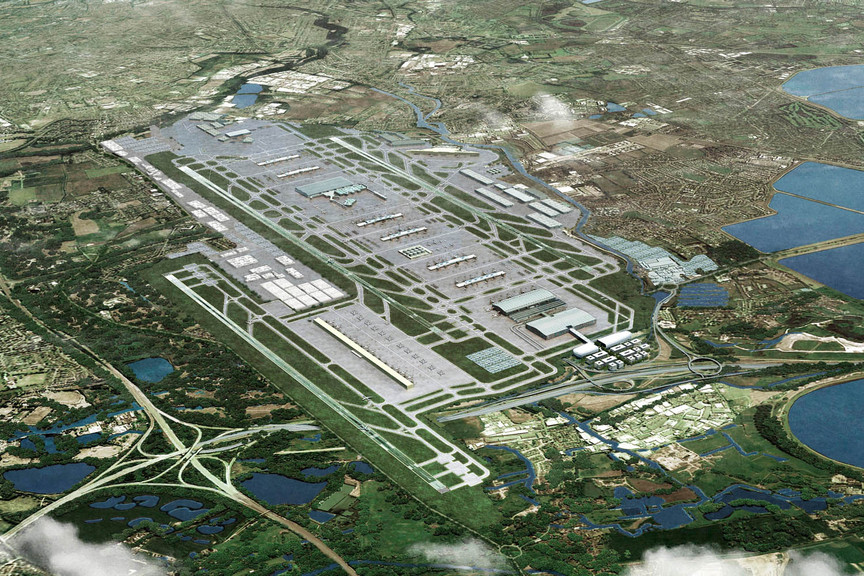The Big Question: Can aviation do more to help disabled travellers?
 Tom Parry
Tom ParryWith stories of accessibility issues – particularly around air travel – regularly making national news titles, it would appear there is need for change, despite the aviation sector’s insistence it is working hard for all passengers, and that change is happening.

At TTG, we believe in encouraging high-quality debate and discussion to drive progress. Our series of Big Question features continues this month with a frank assessment of the industry’s progress on accessibility in aviation, and comes after the second edition of TTG Fairer Travel Week (3-7 July).
With the national press rarely short of accessibility horror stories, airlines and airports are under growing pressure to serve passengers with disabilities and accessibility needs better and more equitably, as our Big Question contributors can attest from often uncomfortable and occasionally degrading personal experience.
But while aviation would undoubtedly agree there is work to do, improving accessibility is far from an overnight fix and will require structural changes that start with manufacturers and run through to the training airport and airline staff receive, the stance of the industry’s regulators, and the very way in which travel is sold.
What do you think? Join in the debate in the comments section below, or email feedback@ttgmedia.com. Alternatively, head to one of TTG’s social media channels to get involved.
'We need a change in mindset from the sector'
Demand for accessible travel is on the rise, with at least one in five people having a disability. It is fast becoming a market no one can afford to dismiss.
However, some parts of the aviation sector are seriously letting disabled travellers down. We cannot allow this to continue, and for the sector to continue failing in its duty of care through a lack of inclusive design and/or equipment or management shortcomings.
I’ve experienced both the good and bad of flying, so I get why some disabled travellers are reticent about it. It’s the 21st century – the aviation industry needs to be more inclusive. Everyone should be able to fly.
One time, my booked assistance didn’t show up. This led to me missing a direct long-haul flight and forced me to take a much later, indirect flight, adding seven hours to an already long journey. Sadly, it’s not an isolated or unusual incident, and it’s inexcusable.
Then, when I found myself stranded in New York due to snow, Virgin Atlantic took us home on a rescue flight. As we’d be landing late, we planned to sleep in the terminal. However, the cabin manager had booked us a hotel room.
The postscript to this story is that two years later, we had the lovely surprise of being looked after by the same guardian angel again on a flight.
So yes, I think disabled travellers are being let down. Despite the groundswell of support for Air4All, someone summed it up by asking: “When is someone going to design a wheelchair – or powerchair – accessible aircraft toilet?”
Airports, meanwhile, must increase assistance personnel and invest in more key equipment. It’s unacceptable that disabled passengers must wait hours to disembark. There must also be a change in mindset from the sector and the CAA.
Jonathan Fletcher is chief executive of The Wheelie Good Travel Company.
'It can feel like disabled passengers are a hindrance'
The aviation industry still has a long way to go to catch up with the rest of the travel sector in terms of catering for disabled travellers, despite recent positive developments.
Air travel has traditionally been notoriously difficult to navigate as a traveller with disabilities, and we keep seeing horrendous stories in the news and on social media of appalling treatment and a general lack of care.
Airport cost-cutting means special assistance teams are chronically understaffed and underpaid, leaving them having to deliver a service that they’re not equipped to. It can feel like disabled passengers are a hindrance, but when this service is provided properly, it can be a seamless and rewarding experience for all.
For example, in Spain, the service is incredible, with well-staffed and well-paid special assistance teams. And recently, we’ve seen some great new developments, like Delta’s wheelchair seat prototype that allows travellers to stay in their own chair onboard.
The single biggest issue is that aircraft are the most inaccessible mode of transport because they aren’t designed to accommodate wheelchairs. Every other mode of transport has been improved, apart from the aviation industry. The complexity of taking wheelchairs onto aircraft needs to be addressed at the design stage, with aircraft manufacturers held accountable.
Improved training and increased awareness can really make a big difference in terms of airport services. I recently had the best and then the worst experiences of my life at an airport in Paris within the space of a month – it’s very hit and miss, and you don’t know what you’re going to get.
Angus Drummond is the founder of accessibility-friendly travel firm Limitless Travel
'Making our cabins more accessible will win loyalty'
If we’ve learnt anything over the past tumultuous years, it’s about recognising differences and ensuring inclusivity at all times. The airline industry has had a tough ride, but is emerging rapidly, with a positive approach to future travel experiences and a commitment to making these fully accessible to all.
Previously, the main barrier was space, a precious commodity for an airline. Every square inch of an aircraft interior has commercial value; having a space dedicated to wheelchair users would reduce revenue opportunities if it was vacant.
Since 2019, the Air4All consortium, which includes Priestman-Goode, Flying Disabled and Sunrise Medical, has been developing a solution that allows a powered wheelchair user to remain in their own chair for the entire journey. It also protects airline revenues – a regular seat can be installed in this space with minimal intervention by the cabin crew.
The second barrier is safety, and the certification needed to maintain the highest standards we expect from the aviation industry. But the involvement of Delta Flight Products in the development of Air4All and their expertise in production and certification in aviation interiors means we're much closer to seeing the Air4All product onboard an aircraft soon.
Good design always results in better outcomes. So rather than wait for a standard legal solution, airlines should consider an option that allows all passengers to enjoy greater independence, dignity and freedom – even if this means changing the established culture of the front row as the cabin’s most profitable real estate.
Brands open to change will benefit. Making cabins more accessible will win the loyalty of those who currently avoid travel because of the problems they face.
Daniel MacInnes is director of PriestmanGoode.
'Aviation works hard to guarantee a great experience for all'
Everyone in aviation works hard to guarantee a great experience for all passengers. Our aim is to ensure the many and varied benefits of air travel – connecting families, opening business opportunities and making trade and travel possible – is available to as many people as possible.
The whole industry, from airports and regulators to airlines and ground operations companies, works closely to deliver as comfortable and seamless an experience as possible. A number of services and approaches have been adopted through the years to meet the needs of all passengers, including those with visible and non-visible disabilities.
For example, guides, wheelchairs and buggies help people navigate security and reach departure gates, and there are multiple step-free options for navigating airports. Many airports also offer quiet routes around terminals, plus rooms for neurodiverse individuals who wish to avoid the hustle and bustle of a busy terminal. Signage and hearing loop technology are also being continually improved to help the partially sighted and/or hard of hearing.
Information about all of the services airports offer, including virtual tours of some terminal buildings, can be found on their individual websites. In addition, information about how passengers can pre-notify airports and airlines of their extra requirements is available, and we encourage travellers to do this.
The industry is in constant dialogue with the CAA to ensure regulatory arrangements around accessibility are sufficient, and in the main, service levels have been good. Airports also work with specialist charities and passenger representative groups to ensure their voices are heard and services are further developed. This all allows people with additional assistance requirements to travel with confidence.
Karen Dee is the chief executive of the Airport Operators Association.
The Big Question by TTG
The Big Question is a monthly feature from TTG taking on some of the burning issues facing travel through expert commentary, insight and debate. While it's not designed to be adversarial, it won't flinch from placing a spotlight on some often uncomfortable topics travel – like it or not – will one day have to reckon with.
- Is the 'S' word starting to put customers off?
- Is direct action targeting commercial travel ever justifiable?
- Is it time to rebrand the travel agent?
- Does travel have an ageism problem?
- Has travel added too much capacity for summer 2024?
- Can celebrity endorsements ever be truly responsible?
- Do women have equal opportunity to progress in travel?
- Should the cruise sector shout about lower prices?
- Is it time for a change of government?
- Has the pandemic changed peaks for ever?
- Is it finally time to turn APD into an environmental tax?
- Does all-inclusive value come at too high a price for the planet?
- Can cruise sail ahead of land-based breaks?
- Should travel companies still be selling captive animal attractions?
- Can aviation do more to help disabled travellers?
- Is there a future for private jets in travel?
- Should agents start charging for their time?
- Is it finally time to reform the Atol scheme?
- Should we be flying during a climate crisis?
Sign up for weekday travel news and analysis straight to your inbox

Tom Parry
Supplier Directory
Find contacts for 260+ travel suppliers. Type name, company or destination.
















